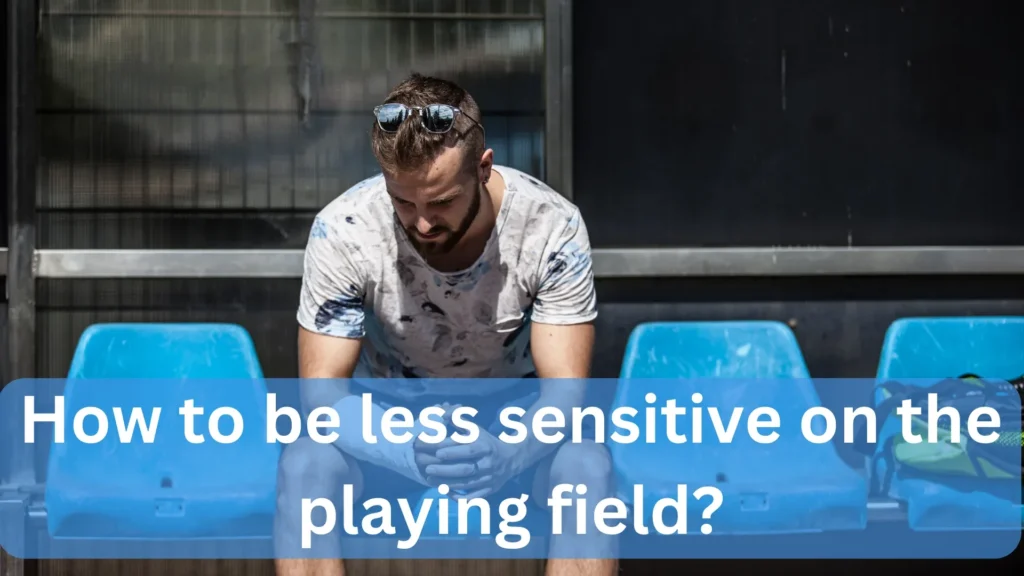
Today we’re going to talk about how to be less sensitive on the playing field and also about some tips to toughen up, without giving up who you really are!
Feeling a bit too sensitive on the playing field?
You’re not alone.
Many athletes struggle with emotional sensitivity, which can impact their performance and enjoyment of the sport.
Let’s dive into what it means to be sensitive, recognize the signs, and most importantly, explore how to be less sensitive.
What Does Being Sensitive Mean?
In the world of sports, being sensitive often means you experience emotions more intensely.
You might take criticism to heart or get upset easily by a bad play or harsh words from teammates or coaches.
While it’s totally normal to feel things deeply, too much sensitivity might keep you from playing your best.
Being sensitive can significantly shape your experience both on and off the field.
Sensitivity, in this context, isn’t just about getting emotional easily.
It also involves how you perceive and process the environment and interactions around you.
If you’re sensitive, you might pick up on subtleties that others miss.
Like slight changes in a coach’s tone or a teammate’s body language.
This heightened awareness can be a double-edged sword.
On one hand, it makes you more empathetic and tuned into team dynamics.
On the other, it can lead to overthinking and emotional turbulence when those subtle cues are perceived as negative.
For athletes, sensitivity often means that emotions can swing quickly based on the events of the game or practice.
A missed shot or a critical comment might not just roll off your back.
Instead, it could sink in deep, affecting your mood and performance longer than it might affect others.
To sum it up, being sensitive means you’re more prone to feeling emotional, more reactive to social cues, and possibly more empathetic.
While these can be valuable traits, especially in team cohesion and leadership, they require careful management to prevent them from undermining your confidence and focus in high-pressure situations.
Signs You Might Be a Sensitive Person
If you’re wondering whether you’re too sensitive for the field, look for these clues:
- Small comments make you upset or angry.
- You dwell on mistakes longer than your teammates.
- You feel nervous or anxious about letting others down.
- You’re often the last to shake off a loss. While your teammates may quickly move on from a defeat, you might ruminate on what went wrong for days.
- Positive and negative feedback affects you strongly. You might feel elated by praise and disproportionately devastated by criticism, more so than your peers.
- You feel unusually fatigued after games. Emotional processing can be exhausting. If you find yourself more drained than others after a game, it might be due to the extra emotional energy you’re expending.
- You’re keenly aware of others’ feelings. This can make you a great team player, but it might also mean you’re absorbing too much of the team’s emotional ups and downs.
- You hesitate to take risks. Concern about potential negative outcomes or fear of criticism might stop you from stepping out of your comfort zone or playing to your full potential.
Identifying these signs is not about labeling yourself as overly sensitive but recognizing the traits that influence how you interact with your sport.
By understanding these aspects, you can start to implement strategies on how to be less sensitive and more resilient in your athletic pursuits.
How to Be Less Sensitive and Don’t Get Discouraged When Things Get Difficult
Here’s the part you’re probably eager for: how to be less sensitive.
Tackling sensitivity in sports isn’t just about toughening up. It’s about smart emotional management.
Here are more strategies on how to be less sensitive and maintain your morale, even when the game gets tough:
- First, recognize that it’s okay to be upset.
The key is not letting it derail your focus or enjoyment!
- Practice self-compassion.
Remind yourself that everyone makes mistakes and that’s part of growing as an athlete.
- Also, work on building a “feedback filter.”
Learn to take constructive criticism for what it is: a tool to help you improve.
Leave out the emotional weight and focus on the actionable advice.
- Establish a pre-game routine.
Having a set routine before games can help stabilize your mood and reduce anxiety.
This might include listening to music, meditation, or a specific warm-up routine that gets you mentally and physically prepared.
- Set realistic expectations.
Understand and accept that not every game will be perfect.
Set realistic performance goals and acknowledge that mistakes are part of learning and improving.
- Focus on what you can control.
You can’t control what others say or every outcome on the field.
Shift your focus to your efforts, your tactics, and your reactions, which are within your control.
- Develop a mantra or affirmation.
Positive self-talk can be a powerful tool for managing sensitivity.
Develop a few affirmations or mantras that you can repeat when you start feeling overwhelmed or overly critical about your performance.
- Limit emotional contagion.
Be mindful of who you spend time with before and after games.
Surround yourself with positive influences and try to limit exposure to overly negative or critical teammates if their mood affects yours.
- Practice mindfulness and breathing techniques.
These can help you center yourself in the moment, reduce the impact of stress, and prevent your emotions from escalating.
- Seek feedback constructively.
When receiving feedback, try to view it as an opportunity for growth.
Ask specific questions about how you can improve, which shifts the focus from what went wrong to how you can get better.
Incorporating these strategies into your routine can help you learn how to be less sensitive.
Over time, you’ll likely find that you are not only performing better but also enjoying your sport more, regardless of the pressures you face.

Examples of Being Less Sensitive
Imagine you missed what could have been a winning goal.
Instead of stewing over it, a less sensitive reaction might be to analyze what went wrong, then let it go.
Maybe you decide to practice more, or maybe you just shake it off and vow to try harder next time.
Another example is dealing with tough coaching.
If your coach is harsh in their feedback, filter out the tone and focus on the message.
What can you learn from their comments?
Seeing practical examples can make it easier to understand how to be less sensitive on the playing field.
- Responding to mistakes:
Imagine a volleyball player who misses a crucial serve during a match.
Instead of brooding over the error, she acknowledges the mistake, considers briefly what to adjust, and refocuses immediately on the next play.
Maintaining her composure and readiness.
- Handling tough feedback:
Consider a basketball player who receives harsh feedback from his coach during a timeout.
Instead of dwelling on the negative tone, he asks for specific advice on how to correct his positioning and uses the criticism constructively to enhance his play in the next quarter.
- Dealing with team conflicts:
A soccer player notices tension between two teammates that starts to affect the team’s morale.
Instead of absorbing the negative emotions or trying to mediate immediately, he focuses on uplifting his own performance and encourages others by example.
Maintaining a positive and professional demeanor.
- Overcoming performance anxiety:
A track athlete feels overwhelming nerves before a big race, a common issue for sensitive individuals.
She uses deep breathing techniques and focuses on her training and abilities, channeling her nervous energy into a focused and powerful start.
- After a disappointing game:
A tennis player loses a match she was expected to win.
Rather than letting this setback consume her thoughts for days, she schedules an extra practice session to work on weak spots identified during the match and uses the experience to fuel her determination for future games.
These examples illustrate how athletes can channel their sensitivity into positive actions that improve their performance and emotional resilience.
Each scenario shows a shift from a potentially paralyzing sensitivity to proactive, performance-enhancing behavior.
By adopting similar strategies, you can learn how to be less sensitive and more effectively handle the emotional challenges of competitive sports.
Beyond the Basics: Emotional Resilience
Building emotional resilience goes a step further than just learning how to be less sensitive.
It’s about developing the capacity to recover quickly from difficulties and using these experiences as growth opportunities.
Here’s how athletes can enhance their emotional resilience:
Visualize positive outcomes
Practice mental imagery to envision successful scenarios in your sport.
This helps build mental toughness and reduces the impact of negative thoughts and feelings that can arise from sensitivity.
Create a support network
Establish a group of supporters, including coaches, teammates, friends, and family, who understand your journey and can provide encouragement and perspective when things get tough.
Knowing you’re not alone in your struggles can be incredibly empowering.
Keep a performance journal
Write down the highs and lows of your training and competitions.
Reflecting on what you’ve overcome and how you’ve improved can boost your confidence and help you see setbacks as part of a larger positive trajectory.
Learn from resilient role models
Observe and learn from athletes who are known for their mental toughness.
Notice how they handle setbacks and criticism, and try to emulate their resilience in your own sporting life.
Engage in cross-training
Participating in different sports or physical activities can not only improve your physical resilience but also help prevent emotional burnout by keeping your routine fresh and enjoyable.
Prioritize self-care
Emotional resilience is rooted in physical and mental well-being.
Ensure you’re getting enough rest, eating well, and engaging in activities that relax and rejuvenate your mind and body.
Seek professional help when needed
Don’t hesitate to talk to a sports psychologist if you find it difficult to cope with sensitivity and its effects on your performance.
Professional guidance can provide you with tailored strategies and support.
By fostering emotional resilience, you not only learn how to be less sensitive but also equip yourself with tools to handle whatever challenges your sporting life throws your way.
These strategies help ensure that your sensitivity becomes a strength, adding depth to your athletic performance rather than hindering it.
Conclusion
Learning how to be less sensitive on the playing field can really change your game.
It’s about managing your emotions in ways that work for you, not against you.
So take these tips, tweak them to fit your style, and watch how they transform your play and your enjoyment of the sport. You’ve got this!
Learning how to be less sensitive in sports is all about balance and smart emotion management.
It’s about taking those intense feelings and channeling them into something positive that boosts your game.
With the strategies we’ve covered, you can start to handle the ups and downs more effectively and enjoy your sport even more.
If you’re looking for more support, the Success Stories Community is here for you.
As your sports psychologist, I’m part of this awesome network where we share heaps of resources and get real about achieving high performance.
It’s a place where you can meet others who are on the same journey, so you never feel like you’re going it alone.
So, whether you’re trying to make a big comeback, or just want to keep improving, remember, every great athlete has been where you are.
Let’s use these tips, tap into the community, and turn your sensitivity into your superpower.
See you on the field!



